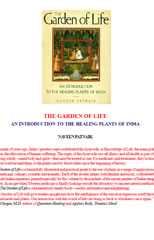
Author : Patnaik Naveen
Title : The garden of life An introduction to the healing plants of India
Year : 1993
Link download : Patnaik_Naveen_-_The_garden_of_life.zip
Introduction. There is a noticeable change in the attitude of friends from other countries who visit me in India today. Once, they asked about gurus and spiritual teachers. Now they express a desire to know about Indian medicine. For a while I thought their enquiries stemmed from the general self-absorption or our times. After all, I was aware that where enlightenment had once been, the rage, today physical fitness was in vogue. Then gradually I began to recognize their past interest in Indian spiritual views was not so different from their present curiosity about Indian medicine. This realization would hardly have surprised the men who founded the Ayurveda thousands of years ago in the mountainous reaches of the Himalayas. They did not separate the external world from man’s inner world, nor did they isolate man's spiritual anguish from his other sufferings. But who were these men? The legend goes that at some time between the second and third millennium before the birth of Christ a conference was held in a Himalayan cave, attended only by the greatest sages in India. Walking thousands or miles to reach their remote destination, India’s most enlightened scholars, ascetics, and teachers were drawn by the monumental purpose of their gathering. Their goal was nothing less than the alleviation of human suffering. From their individual experience and learning these thinkers had already identified the nature of human suffering as being spiritual, mental, and physical. Now they proceeded to examine the means by which such suffering could he healed. They called their enquiries the Ayurveda, or the “Knowledge of Life.” The fundamental philosophy of Ayurveda says that suffering is disease, contentment is good health. No man is truly healthy who does not possess a sound body, a sound mind, and a sound soul. This philosophy makes Ayurveda more than a school of medicine. Its logic prescribes a whole way of life, based on knowledge and an awareness that man is interdependent with all other forms of life, spirit is described as the intelligence of life, matter as its energy. Both are manifestations of the principle or Brahman the oneness of life. To the founders of Ayurveda, mankind’s goal was the understanding of this principle. The man who recognizes how he is linked with universal life is a man who possesses a sound soul because he is not isolated from his own energies, nor from the energies of nature. But as the highest form or life, man also becomes its guardian, recognizing his very survival depends on seeing that the fragile balance or nature, and living organisms, is not disturbed. In Ayurvedic terms, this means that a man must prevent wanton destruction. What he takes he must replace, to preserve the equilibrium of nature. If he cuts down a tree for his own uses, he must plant another. He must ensure the purity of water; he must not poison the air. He must not poison the soil. Ayurveda, some four thousand years ago, was already propagating the arguments which inform the ecological debate of our own time. The logic of Ayurvedic philosophy, with its insistence on maintaining nature’s equilibrium, continues by observing that if a man’s spiritual health is dependent on his ability to live in harmony with the external universe, his mental health must depend on his ability to live in harmony with himself. From its very origins this science paid as much attention to the illnesses of the mind as to illnesses of the body. A separate school of Ayurvedic medicine developed to administer to the diseases of the mind. Its physicians identified the techniques of deep breathing and meditation for quieting the mind and for improving the memory and other menial capacities, that practitioners or yoga would later use. Sedatives and tranquilizers were known and used by early Ayurvedic physicians. To calm the mind, and reinforce its own balance, Ayurveda noted the ways in which aromatics, diet, even cosmetics could help sustain mental equilibrium. But again, because the originators of the Ayurveda saw every illness and every form of health as part of an interlocking whole, a man's mental condition was seen as having both a physical and a social impact. The morally ill man was also the mentally ill man. If a man willfully disturbed the balance of living things he inevitably damaged himself. The Ayurvedic doctor tried to make his patient understand that in order to avoid suffering, the patient must control his own destructive and self-destructive instincts. ...

Demolins Edmond - L'éducation nouvelle
Auteur : Demolins Edmond Ouvrage : L'éducation nouvelle Année : 1898 Lien de téléchargement :...














